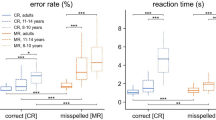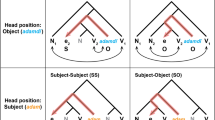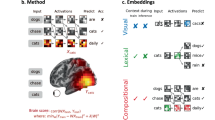Abstract
Adult second-language (L2) learning is often claimed to be slow and laborious compared to native language (L1) acquisition, but little is known about the rate of L2 word learning. Here we report that adult second-language learners' brain activity, as measured by event-related potentials (ERPs), discriminated between L2 words and L2 'pseudowords' (word-like letter strings) after just 14 h of classroom instruction. This occurred even while the learners performed at chance levels when making overt L2 word-nonword judgments, indicating that the early acquisition of some aspects of a new language may be overlooked by current behavioral assessments.
This is a preview of subscription content, access via your institution
Access options
Subscribe to this journal
Receive 12 print issues and online access
$209.00 per year
only $17.42 per issue
Buy this article
- Purchase on Springer Link
- Instant access to full article PDF
Prices may be subject to local taxes which are calculated during checkout


Similar content being viewed by others
References
Osterhout, L., McLaughlin, J. & Bersick, M. Trends Cogn. Sci. 1, 203–209 (1997).
Kutas, M. & Van Petten, C. in Handbook of Psycholinguistics (ed. Gernsbacher, M.) 83–143 (Academic, New York, 1994).
Bentin, S. Brain Lang. 31, 308–327 (1987).
Kutas, M. & Hillyard, S.A. Science 207, 203–205 (1980).
Chwilla, D.J., Brown, C.M. & Hagoort, P. Psychophysiology 32, 274–285 (1995).
Green, R.M. & Swets, J. Signal Detection Theory and Psychophysics (Krieger, Huntington, New York, 1974).
Saffran, J.R., Aslin, R.N. & Newport, E.L. Science 274, 1926–1928 (1996).
Miller, J. Percept. Psychophys. 58, 65–72 (1996).
Acknowledgements
This work was supported by National Institute on Deafness and Other Communication Disorders grants R01DC01947, P30DC04661 and F32DC005756.
Author information
Authors and Affiliations
Corresponding author
Ethics declarations
Competing interests
The authors declare no competing financial interests.
Rights and permissions
About this article
Cite this article
McLaughlin, J., Osterhout, L. & Kim, A. Neural correlates of second-language word learning: minimal instruction produces rapid change. Nat Neurosci 7, 703–704 (2004). https://doi.org/10.1038/nn1264
Received:
Accepted:
Published:
Issue Date:
DOI: https://doi.org/10.1038/nn1264
This article is cited by
-
Biliteracy and acquisition of novel written words: the impact of phonological conflict between L1 and L2 scripts
Psychological Research (2022)
-
Rapid acquisition of novel written word-forms: ERP evidence
Behavioral and Brain Functions (2020)
-
Modelling the N400 brain potential as change in a probabilistic representation of meaning
Nature Human Behaviour (2018)
-
Repeated Exposure to “meaningless” Pseudowords Modulates LPC, but Not N(FN)400
Brain Topography (2015)



